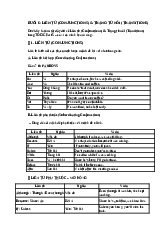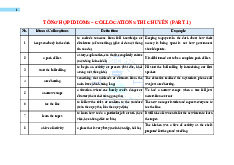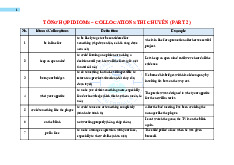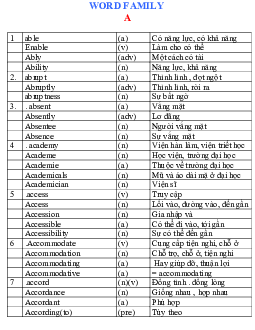






Preview text:
Use the word given in capitals to form a word that fits in the gap in the sentences. AUTUMN COLORS
A new term is rapidly gaining recognition in the American language - a 'leaf peeper' is
someone who, in autumn, is on the ___lookout______ (1. LOOK) for areas where the leaves of
deciduous trees have changed colour. In New England, in the USA, 'leaf peeping' is big business,
generating millions of dollars annually. The first report that leaves are changing colour sets off an
____invasion______ (2. INVADE) of 'peepers' thus causing serious obstruction on some roads.
Thousands of people log on to websites in their _____eagerness______ (3. EAGER) to find the
location of the trees that have foliage in the most _____glorious_______ (4. GLORY) colours.
The popularity of 'leaf tourism' is well established in New England, and the changing colours of
autumn provide an annual ____talking_________ (5. TALK) point. The colours vary from year
to year since the ____ (6. INTENSITY) of the colour is ____________ (7. DEPENDENT) on
the chemical composition of the dying leaves. After a long dry summer, leaves often turn bright
red, while cloudy autumn days will produce less spectacular yellows. If climate change leads to
__________ (8. INCREASINGLY) hot, dry summers in the northern hemisphere, then countries
in Europe can expect summers not ____________(9.UNLIKE) those across the Atlantic. They
will then enjoy a kaleidoscope of ___________ (10. SEASONAL) colour to rival the deep reds
and blazing oranges seen in New England.
The mysteries of the skies
Three hundred and fifty years before the first men looked down on the amazingly beautiful
surface of the moon from close quarters, Galileo’s newly built telescope (1. ENABLED)
____________ him to look at the edge of the hitherto mysterious sphere. He saw that the
apparently (2.LIFELESS) ____________ surface was not divinely smooth and round, but
bumpy and imperfect. He realized that although the moon might appear (3. INACTIVE)
____________, resembling a still life painted by the hand of a cosmic (4.ARTIST)
___________, it was a real world, perhaps not very different from our own. This amounted to a
great (5.ACHIEVEMENT) _________ hardly to be expected in his day and age, although
nowadays his (6.CONCLUSION) ____________ may appear to some to be trivial and
(7.INSIGNIFICANT) __________. Not long after Galileo lunar’s observations, the skies
which had previously been so (8.ELUSIVE) ____________ revealed more of their
extraordinary mysteries. Casting around for further wonders, Galileo focused his lens on the
(9.STRIKING) __________ planet of Jupiter. Nestling next to it, he saw four little points of
light circling the distant planet. Our moon it appeared, perhaps (10.UNFORTUNATELY)
_________ in the eyes of those fearful of what the discovery might mean, was not alone!
COPING SKILLS FOR HAPPIER COUPLES
Psychologists agree that conflicts are inevitable in almost any long-term (1)__________
(RELATIONSHIPS); however, what matters most is the way in which they are resolved rather than the
sources of the (2)___________ (DISAGREEMENTS) themselves. According to recent studies, the
methods that couples use to settle their differences are crucial to the success of the outcome.
One of the interesting findings is that although (3)___________ (EXCESSIVELY) aggressive
behaviour patterns are obviously (4)___________ (UNDESIRABLE), what must be avoided at all costs is the
(5)___________ (SUPPRESSION) of anger, as feelings of resentment can lead a relationship to break
down(6)___________(IRRETRIEVABLE).
It is essential for couples to communicate when things start going wrong, and successful conflict
(7)___________ (RESOLUTION) involves a three stage process. Firstly, one partner should explain
precisely what the problem is and should try and remain as calm and (8)___________
(UNEMOTIONAL) as possible. Secondly, the couple should discuss the specific problem in detail,
taking care not to rake up old grievances. Finally, and perhaps most (9)___________
(IMPORTANTLY), there should be negotiation until a (10)___________ (SATISFACTORY)
agreement is reached. This may not mean that their problem will be solved, but even this is preferable to allowing a problem to rankle.
* Responding to unprovoked insults that have been thrown at you is a wonderful way of honing your
sense .The great (41)________________ ( PLAYWRIGHT) George Bernard Shaw was a
contemporary of Winston Churchill’s. GBS thoughtfully invited Churchill to the first night of one of his
plays (42) ______________ (ENCLOSING) two tickets with a note which said “One for yourself and
one for your friend- if you have one” Churchill lost no time in writing back, saying that unfortunately ,
due to pressure of work, he would be unable to come, but could he have tickets for the second night-if
there is one” . This joke was (43)___________(UPDATED) more recently by a prominent politician in
the labour party, when speaking to a colleague and (44)__________ ( LONG-TERM) rival of his. The
two men found themselves in the same meeting, despite being sworn enemies. The colleague
apparently rose to excuse himself, saying that he had arranged to phone some friends, whereupon the
statesman immediately handed him a small coin ( enough for a brief local call) and said (45)
_________(WITTINGLY) , “There you are. Go ahead and phone them all”.
* People are often put off meditation by what they see as its many mystical associations. Yet meditation
is a (1. STRAIGHT-FORWARD) _____________ technique which merely involves sitting and resting
the mind. In addition to its (2. SIMPLICITY) ____________, meditation offers powerful help in the
battle against stress. Hundreds of studies have shown that meditation, when (3.UNDERTAKEN)
_____________ in a principled way, can (4. REDUCE) ________________ hypertension which is
related to stress in the body. Research has proved that certain types of meditation can (5.
SUBSTANTIALLY) _______________ decrease key stress symptoms such as (6. ANXIETY)
____________and (7. IRRITABILITY)_______________. In fact, those who practise meditation with
any (8. REGULAR) ________________ see their doctors less and spend, on average, seventy per cent
fewer days in hospital. They are said to have more stamina, a happier (9.
DISPOSITION)_____________ and even enjoy better relationships. When you learn to meditate, your
teacher will give you a personal 'mantra' or word which you use every time you practise the technique
and which is (10. SUPPOSEDLY) ____________ chosen according to your needs. Initial classes are
taught (11. INDIVIDUALLY) _____________ but (12. SUBSEQUENT)______________ classes
usually consist of a group of students and take place over a period of about four days. The aim is to
learn how to slip into a deeper state of (13.CONSCIOUSNESS) ____________ for twenty minutes a
day. The rewards speak for themselves. WOMEN ONLY
(1. INCREASINGLY)________________, women are taking their holidays without men. For (2.
SAFETY) _______________ reasons, camaraderie or just plain fun, a growing number of female
tourists are signing up for women-only trips. Twenty years ago only a (3.HANDFUL) ____________ of
companies offered such holidays; now there are several hundred. Travel (4. CONSULTANT)
_______________Andre Littlewood says that the ( 5.COMBINATION) _____________of higher
incomes with delayed marriage, divorce, ( 6.RETIREMENT) ______________ and (7.
WIDOWHOOD)________________ has ( 8.ENABLED) _________________ more women to travel,
often on their own. They are attracted by the sense of ( 9. FREEDOM) ______________that a holiday
without men affords them. “Women in a group tend to feel ( 10. UNINHIBITED) ______________and
speak more openly than when men are around”, she adds. “Even on energy-sapping adventure holidays
the atmosphere is relaxed and (11. COOPERATIVE) _______________. It’s also a great deal more
fun. Women laugh more (12. READILY) _______________ than men, probably because they don’t
mind laughing at themselves.” Since her divorce Janice Cummings has been a regular traveller with
Everywoman Tours, and Oxford-based Company whose very name is a ( 13. DETERMENT)
____________ to men. “And a good thing too,” she says. “Men simply cannot resist the ( 14.
TEMPTATION) _______________to try and take control, no matter where they are. And that includes
on holiday. Thankfully, there is none of that with Every woman.”
* Choose the word that best fits each of the blanks in the following passage.
F. The ability to weep is a uniquely human form of emotional response. Some scientists have
suggested that human tears are (1) _____ of an aquatic past – but this does not seem very likely. We cry
from the moment we enter this world, for a number of reasons. Helpless babies cry to persuade their
parents that they are ill, hungry or uncomfortable. As they (2) _____, they will also cry just to attract
parental attention and will often stop when they get it.
The idea that having a good cry do you (3) _____ is a very old one and now it has scientific validity
since recent research into tears has shown that they (4) _____ a natural painkiller called enkaphalin. By
fighting sorrow and pain this chemical helps you feel better. Weeping can increase the quantities of
enkaphalin you (5) _____. Unfortunately, in our society we impose restrictions upon this naturally (6)
_____ activity. Because some people still regard it as a (7) _____ of weakness in men, boys in
particular are admonished when they cry. This kind of repression can only increase stress, both emotionally and physically.
Tears of emotion also help the body (8) _____ itself of toxic chemical waste, for there is more protein
in them than in tears resulting from cold winds or other irritants. Crying comforts, calms and can be
very enjoyable – (9) _____ the popularity of highly emotional films which are commonly (10) _____
“weepies”. It seems that people enjoy crying together almost as much as laughing together. 1. A. witness B. evidence C. result D. display 2. A. evolve B. change C. develop D. alter 3. A. better B. fine C. good D. well 4. A. contain B. retain C. hold D. keep 5. A. construct B. achieve C. provide D. produce 6. A. curing B. treating C. healing D. improving 7. A. hint B. symbol C. feature D. sign 8. A. release B. rid C. loosen D. expel 9. A. consider B. remark C. distinguish D. regard 10. A. named B. entitled C. subtitled D. called
G. Have you ever asked yourself what you are working for? If you have ever had the time to (1)____
this taboo question, or put it to others in moment of weakness or confidentiality, you (2)____ well have
heard some or all of the (3)____ It’s the money of course, some say with a smile, as if explaining
something to a small child. Or it’s the satisfaction of (4)____ well done, the sense of achievement
behind the clinching of an important (5)____. I worked as a bus conductor once, and I can’t say I
(6)____ the same as I staggered along the swaying gangway trying to (7)____ out tickets without falling
over into someone’s lap. It’s the company of other people perhaps, but if that is the (8)____ , what about
farmers? it is the conservation in the farmyard that keeps them captivated by the job? Work is power
and a sense of status say those (9)____ have either attained these elusive goals, or feel aggrieved that
nobody has yet recognized their leadership (10)____ Or we can blame it all on someone else, the family
or the taxman. I suspect, and say this under my (11)_____., that most of us work rather as Mr.
Micawber lived, hoping for something to (12)___ up. We’ll win the pools, and tell the boss what we
really think. We’ll scrape together the (13)____ and open that little shop we always dreamed of, or go
(14)____ the world, or spend more time in the garden. Once day we’ll get that (15)____ we deserve, but
until then at least we have something to do. And we are so busy doing it that we won’t have time to wonder why. 1. A. propose B. meditate C. consider D. launch 2. A. might B. can C. will D. should 3. A. below B. rest C. following D. latter 4. A. a work B. a job C. a task D. an effort 5. A. deal B. position C. job D. engagement 6. A. enjoyed B. wished C. hoped D. felt 7. A. make B. turn C. issue D. give 8. A. one B. case C. question D. former 9. A. people B. must C. who D. to 10. A. qualities B. status C. property D. requirements 11. A. oath B. suspicion C. breath D. pressure 12. A. move B. turn C. ease D. end
13. A. resources B. opportunities C. rest D. money 14. A. round B. over C. into D. to 15. A. ambition B. station C. vocation D. promotion
H. It is now extremely popular to take a gap year between school and university or university
and work and to spend it traveling. There are plenty of reasons to recommend it - travel broadens the
mind, you’re (1) ___ young once, life isn’t a rehearsal and so on. And if you don’t do it, you may
always regret that you didn’t take the (2) ___. In the end, there’s only one response: well, why not?
The idea may have its roots in the 18th century Grand tour once (3) ___ by the young, rich and
noble, but it is the middle classes who have turned it (4) ___ something that 200,000 British
youngsters do every year. (5) ___ has never been so easy and cheap, with more places open to
tourists than ever. Also, the gap year is now (6) ___ by many employers and universities.
The States, the Far East and Australia were among the original (7) ___ and although these
remain in the top five, young explorers are now going even further. The most far-flung corners of the
world are (8) ___ in popularity year by year. About $700 will buy a student ticket (9) ___ for six
months that will take you from London to Calcutta, Singapore, Bangkok, Perth, Sydney, Auckland,
Fiji, Tahiti, Los Angeles and (10) ___ again. 1. A. merely B. only C. slightly D. simply 2. A. occasion B. moment C. chance D. luck 3. A. undertaken B. gone C. done D. given 4. A. up B. out C. over D. into 5. A. Voyage B. Travel C. Excursion D. Tour 6. A. received B. stood C. accepted D. admitted 7. A. destinations B. endings C. landings D. terminals 8. A. spreading B. expanding C. enlarging D. growing 9. A. genuine B. valid C. effective D. legal 10. A. now B. here C. back D. then
I. If you (1)_____ to be walking in your local park tomorrow and you find an abandoned book
with a label inside (2)_____ 'Read and Release me', don't just treat it as a joke. You've probably come
(3)_____ an example of 'book-crossing', a book-sharing movement started in 2001 by American
software developer Ron Hornbaker, whose stated aim is to 'make the (4)_____ world a library'. Book-
crossers 'release' books (5)_____ by passing them on to friends, or else by leaving them in public
places for others to pick up, or 'catch', and then read, before they (6)_____ turn release them back 'into
the wild'. (7)_____ a book has been 'caught', the person finding it is encouraged to record the event by
logging on to the book-crossing website and entering the book's ID number written on the label. That
(8)_____ , both the original owner and subsequent readers of the book can keep track of its progress.
Over half a million people worldwide participate in book-crossing, 'releasing' books in a (9)_____ range
of locations including cafés, airports, bus stations, telephone boxes and even underwater in public
fountains. Often a book is left in a place (10)_____ is relevant to its title or content: Agatha Christie's
Murder on the Orient Express on a train, for example, or an archeology book in a museum. 1. A. occur B. happen C. pass D. arise 2. A. telling B. saying C. talking D. answering 3. A. away B. along C. across D. aside 4. A. full B. absolute C. quite D. whole 5. A. either B. but C. or D. neither 6. A. at B. to C. in D. for 7. A. Soon B. Since C. Once D. While 8. A. way B. time C. place D. manner 9. A. deep B. long C. high D. wide 10. A. what B. which C. who D. where
J. If you’re an environmentalist, plastic is a word you tend to say with a sneer or a snarl. It has
become a symbol of our wasteful, throw-way society. But there seems little (1)_____ it is here to stay,
and the truth is, of course, that plastic has brought enormous (2)_____ even environmental ones. It’s
not really the plastics themselves that are the environmental (3)_____ – it’s the way society choose to
use and (4)_____ them. Almost all the 50 or so different kinds of modern plastic are made from oil,
gas or coal – non-renewable natural (5)_____ We (6)_____ well over three million tones of the stuff
in Britain each year and, sooner or later, most of it is thrown away. A high (7)_____ of our annual
consumption is in the (8)_____ of packaging, and this (9)_____ about seven per cent by weight of our
domestic (10)_____ Almost all of it could be recycled, but very little of it is, though the plastic
recycling (11)_____ is growing fast. The plastics themselves are extremely energy-rich – they have a
higher calorific (12)_____ than coal and one (13)_____ of ‘recovery’ strongly (14)_____ by the
plastic manufacturers is the (15)_____ of waste plastic into a fuel. 1. A. evidence B. concern C. doubt D. likelihood 2. A. pleasures
B. benefits C. savings D. profits 3. A. poison B. disaster C. disadvantage D. evil 4. A. dispose B. store C. endanger D. abuse 5. A. resources B. processes C. products D. fuels 6. A. remove B. import C. consign D. consume 7. A. portion B. amount C. proportion D. rate 8. A. way B. kind C form D. type 9. A. takes B. makes C. carries D. constitutes 10. A. refuse B. goods C. requirements D. rubble 11. A. manufacture B. plant C. factory D. industry 12. A. degree B. value C. demand D. effect 13. A. measure B. mechanism C. method D. medium 14. A. desired B. argued C. favored D. presented 15. A. conversion B. melting C. change D. replacement
*Read the passage carefully , then fill in the blank a suitable word.
F. Around the age of eighteen, you must make one of the biggest decisions of your life. "Do I stay
on at school and hopefully go on to university (1)__LATER___? Do I leave and start work or begin (2) _A___ training course?".
The decision is yours, but it may be (3)__WORTH___ remembering two things: there is more
unemployment among people (4)__WHO___ haven't been to university, and people who have the right
(5)SKILLS_____ will have a big advantage in the competition for jobs. If you decide to go straight
into a job, there are many opportunities (6)__FOR___ training. Getting qualifications will
(7)_HELP____ you to get on more quickly in many careers, and evening classes allow you to learn
(8)__WHILE___ you earn. Starting work and taking a break to study when you are older is
(9)_ANOTHER____ possibility. This way, you can save up money for your student days, as well as
(10)GETTING____ practical work experience.
G. I was reading an article last week in (1)__WHICH___ the writer described (2) __HOW___ her
children has changed as they (3)__GREW___ up. When they were small she had to (4)__PUT___ up
with noisy games in the house, or join in interminable games of football in the garden which
(5)__WORE___ her out. If the house went quiet, she wondered what the monsters were getting up to,
or what crisis she would have to (6)__DEAL___ with next. She dreaded the fact that they might
(7)__TAKE___ after her husband, who admitted having (8)__BEEN___ an uncontrollable child who
(9)__SPENT___ most of the time showing off to his friends by breaking things or getting into fights.
What was worse was that (10)__EVERYONE___ else thought he was a sweet child, and he got away
with the most terrible things! However, she had experienced an even greater shocked with her children.
They had (11)__GROWN___ out of all their naughty behavior, and (12)_TAKEN____ up serious
hobbies (13)_SUCH____ as chess and playing the piano. They never did anything without
(14)THINKING_____ it over first, and coming to a serious decision. She had to face up to the fact that
they made her feel rather childish as they got (15)_OLDER___, and that in some ways she preferred
them when they were young and noisy.
H. Fish live almost (1) __EVERYWHERE_ They are found in the near freezing waters of the
Artic and in the steaming (2)WATERS____ in the tropic jungles. They live in roaring streams and in
quiet (3)___UNDERGROUND__ rivers. Some fish make long journeys (4) _ACROSS___ the ocean.
Others spend most of their life buried in sand on the ocean (5) ____BOTTOM__. Most fish can’t
(6)__LEAVE___ water; yet some survive for months in dried-up riverbeds.
Fish have enormous importance (7)TO____ man. They provide food for millions of people.
Fishermen catch them for sports, and many people (8)_KEEP___ them as pets. Fish are also important
in the balance of nature. They eat plants and animals and in turn, become (9)__FOOD__ for plants and
animals. Fish thus help keep in (10 ) BALANCE_____ the total number of plants and animals on the earth.
I. As swimming became a popular recreation in England during the 1860s and 1870s, several (1)
__WATER____ sports developed, roughly patterned after land sports. (2) _AMONG_____ them were
water football (or soccer), water rugby, water handball, and water polo, in which players rode on
floating barrels, painted to look (3) __LIKE____ horses, and struck the ball with a stick. Water rugby
became most popular of these sports, but somehow the water polo name became attached to it, and it's
been attached (4) __EVER____ since.
As played in England, the object of the sport was for a player to touch the ball, with both (5)
__HANDS____, at the goal end of the pool. The goaltender stood on the pool deck, ready to dive on
any opponent who was about to score. Water polo quickly became a very rough sport, filled (6)
___WITH___ underwater fights away from the ball, and it wasn't unusual for players to pass out for
lack of air. In 1877, the sport was tamed in Scotland by the addiction of goalposts. The Scots also
replaced (7) ____THE__ original small, hard rubber ball with a soccer ball and adopted (8)
_RULES_____ that prohibited taking the ball under the surface or, "tackling" a player unless he had the
ball. The Scottish game, which emphasized swimming speed, passing, and (9) __TEAM____ work,
spread to England during the early 1880s, to Hungary in 1889, to Austria and Germany in 1894, to
France in 1895, and (10) ___TO___ Belgium in 1900.
Water polo was the first team sport added to the Olympic program, in 1900.
J. Australia is a big country, but nearly all Australians live near the sea. On hot summer days, you
can see thousands of people at the beach. Many beaches have waves (1)______ are very high.
These large waves are known as surf and the people who ride them are called surfers. Surfing is a
skill, and it needs learning. Don’t (2)______ to be able to surf properly the (3)______ time you try.
However, by practising a few times you will learn (4)______ to do it.
Surfing is not a new sport. Perhaps its origins need explaining. It started hundreds (5)______ years
ago in Hawaii. Men swam (6)______ to sea to catch fish and found they could come back to land very
quickly by riding the waves. These first surfers did not (7)______ a board. They were “body surfers”.
Many people (8)______ do this type of surfing today.
After a while people started to use boards and rode the waves by lying, kneeling or standing
(9)______ them. These first surfboards were made of wood and the water made them rot after a while.
Today, surfboards are made of plastic or fibreglass (10)______.
K. In the religion of the ancient Greeks, a hero was a mythical being to whom regular worship was
offered. A hero was distinct from a god in that, unlike the (1)____________he was regarded as mortal:
it was indeed his death alone, and an exceptional death at that, which made him (2)______________of
fulfilling the requests of those who (3)___________him. The hero could ensure general good fortune,
such as (4)_____________ in war, prosperity in peace and success in all enterprises.
The stages in the development of the heroic myth began with the birth of the hero, (5)____________
often to the intervention of one of the gods. Some scholars have wished to find (6) ___________all
stages of the hero's development elements (7)___________ symbolically to the stages through which
youths (8)__________ to undergo initiation had to pass, but it is chiefly in the educational phase of their
development that this analogy would seem to have some truth. However, the main subject of mythical
narration consisted of the heroic exploits of the central (9) __________ of wars and duels, of the slaying
of giants and monsters, and of the liberation of regions from such scourges. During his lengthy
wanderings, before achieving his final conquest, the hero founded cities, gave laws to the people and
established cults. The hero's death, always under unusual (10) ______________determined his status forever.
Document Outline
- AUTUMN COLORS




